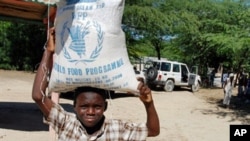The international charity Oxfam says the food aid pouring into Haiti is harming the country's economy, especially its agricultural sector. Oxfam says the international community needs to make a radical shift in how it deals with rebuilding the country.
Oxfam says the aid that poured into Haiti after the earthquake was needed for the millions who were displaced - but it has not been good news for the country's agricultural sector.
International senior researcher for the charity group, Marc Cohen, says the majority of Haitians live in the countryside and depend on agriculture for their livelihood, but for decades investment in that sector has been poor.
"Dating back even into the late 1950s, the focus of both the Haitian government and donors was on urban development," Cohen said, "and to some extent a manufacturing sector and there was very little investment in the rural areas."
He says that situation has not been helped by the major influx of overseas grains to cope with the earthquake.
Reconstruction
Haiti's government has developed an agricultural reconstruction plan that would cost more than $700 million. Cohen says international donors should help provide the funding.
"At this point it is important to shift away from external food aid and look at developing and supporting local agriculture and procuring food that will be used in assistance programs increasingly from local farmers," he said.
According to the Oxfam report nearly 90 percent of the rural population was living on less than $2 a day before the earthquake hit.
Development
Sabina Alkire from the Britain-based Oxford Poverty and Human Development Initiative says Haiti is the poorest country in the Western hemisphere and needs major international attention.
She says agricultural development is crucial, but that it is important emergency aid does not dry up before the long-term plans are in place.
"Very often when emergency aid comes in one set of actors are engaged but many times these agencies leave but there may be six months or a year of no support and then long term development agencies come in but the fruit of their investment is only realized after a couple years," Alkire said.
Barriers
The Oxfam report is also critical of trade barriers.
It says Haitian exports should have full duty free access to U.S. markets without a capped quota. And it says Haiti should be excluded from the Bumpers Amendment, which bans direct assistance to industries, such as rice, that could compete with U.S. exports.
The January earthquake killed about 300,000 people in Haiti.
Oxfam Says Haitian Farmers Suffering from Food Aid




